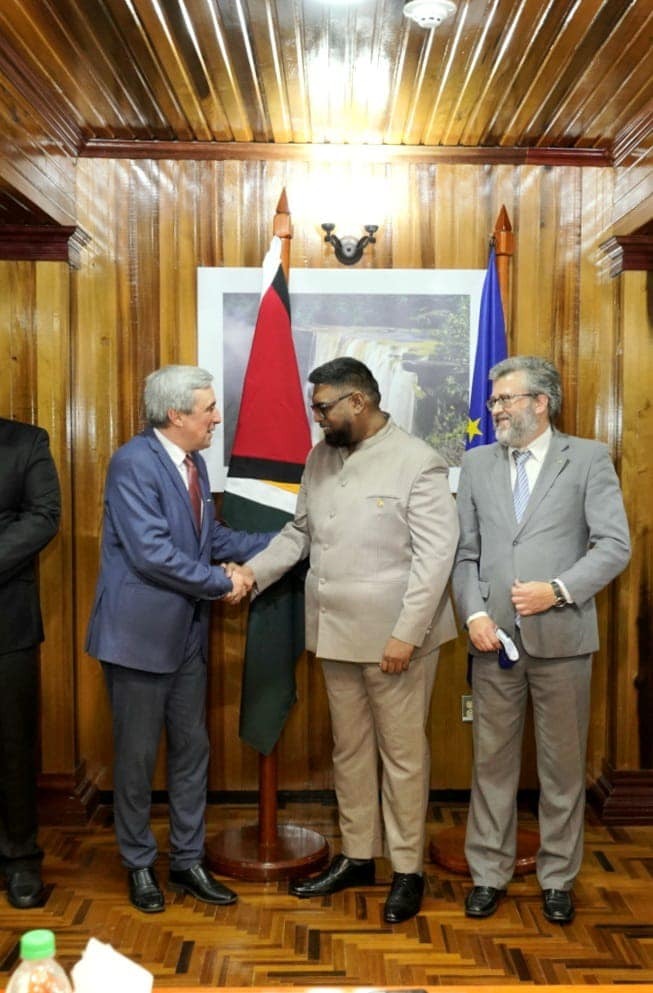EU disburses final €7.56M budget support funding to Guyana

The European Union (EU) has disbursed some €7.56 million into the Guyanese economy – the last tranche from its Budget Support Programme for the country.
President Dr Irfaan Ali met with a high-level delegation from the European External Action Service (EEAS) led by its Deputy Managing Director for the Americas, Javier Nino Perez. They were accompanied by the European Union’s Ambassador to Guyana, Fernando Ponz Cantó.
On Government’s side, President Ali was joined by Prime Minister Mark Phillips, Vice President Bharrat Jagdeo, Senior Minister within the Office of the President with responsibility for Finance Ashni Singh, Parliamentary Affairs and Governance Minister Gail Teixeira, Foreign Affairs and International Cooperation Minister Hugh Todd, Public Works Minister Juan Edghill, and Minister within the Public Works Ministry Deodat Indar.
In a subsequent press conference, the Head of State announced that the disbursement totals in excess of $1.7 billion. This is part of the multi-annual programme to support Guyana’s developmental agenda through budget support, following the end of the preferential market with Europe. Previous tranches have been spent in climate adaptation, housing, infrastructure and sea defences.
“This disbursement represents the last tranche of our budget support programme with the European Union and it is indicative of the decades-old EU-Guyana partnership…It speaks to the Government’s strong commitment to ensuring that we work within the framework as approved by the European Union, ensure that our systems are responsive, and that our systems are strong enough for our international partners to have the confidence in us in making this disbursement,” said the Head of State.
Speaking on the rebuilding of Guyana’s sea and river defence, he outlined funds have been used to rehabilitate severely-deteriorated sea defence systems along the coastline to protect low-lying areas that are prone to high tide. New mangrove sites have also been established as a natural defence mechanism, further protecting against disasters.
“As a result of this intervention, thousands of acres of arable agricultural lands under cultivation are protected from the intrusion of the sea. In addition, residents of these low-lying areas also suffer great losses of their crops and livestock as well as extensive damage to their homes. These resources that are being provided today will greatly assist in improving the lives of people of Guyana and will help to offset expenditure that has been incurred in our relentless struggle to defend our coastal zone from the intrusion of the aggressive Atlantic Ocean.”
He also clarified the “misconception” that while Guyana might be a new player in the oil sector with projection of a leading global economy, there is a transitional gap. For this, talks are in the pipeline for new programming and concessional support from the EU.
“We’re making the case that in that transition gap, Guyana still qualifies for concessional financing and support from international agencies because the strong flow of revenue from the oil and gas sector would not occur immediately. There will be a timeframe that it would take…Discussions on new programming are ongoing and I will want to say, promising,” the President positioned.
The EU has been Guyana’s largest provider of grant resources. As such, the Head of State asserted that both sides are seeking to deepen their relationship, delving into serious political partnership and supporting the country’s governance system. There are plans to improve the competitiveness and diversifying the economy.
Meanwhile, Ali shared that the engagement also spanned making the traditional sectors competitive and Guyana’s role in the regional integration process.
“We discussed areas surrounding governance, improvement in the various arms that constitute the State, electoral reforms, ways in which the EU can support us in supporting democracy and importantly, working with the EU as close partners in championing Guyana’s cause in partnering with the EU, promoting joint collaboration for Private Sector, in looking at the political and governance level and seeking support from the European Union in strengthening our political and governance systems.”
Officials would have tapped into discussions on how the organisation can support the modernisation of the financial sector, anti-corruption framework from the legislative, institutional and transactional perspectives.
Meanwhile, the EU Deputy Managing Director said the commonality between Guyana and the EU will pave the way for stronger relationship beyond the current scope, and focus on the political benefits. The mutual belief in human rights, multilateralism and societal systems to benefit people are the core of this arrangement.
“We’ve come with a message of hope and commitment. A message of commitment to build a strategic partnership that goes well beyond what we had in the past; a partnership that should have many strengths, one of which is to build a truly, generally effective political partnership. We want to be partners with Guyana, political friends of Guyana, because we both face the challenges of today’s world, believe in the same principles and with the same objectives,” Perez told media operatives.
In addition, Ambassador Ponz Canto shared, “We know how important it is for you to be protected, also in the context of climate change. It is a contribution from the European Union so that the country can adapt itself better to the change in patterns of weather and climate change, but it is also a contribution to improve the infrastructure of the country.”

